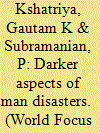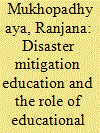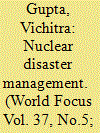|
|
|
Sort Order |
|
|
|
Items / Page
|
|
|
|
|
|
|
| Srl | Item |
| 1 |
ID:
132489


|
|
|
|
|
| Publication |
2014.
|
| Summary/Abstract |
Disaster is a term one would rather be not associated with because of the negative vibes that it sends out. The ways and means to overcome the negative-thoughts that are brought on in the wake of disaster assume a lot of importance. The consequences of disaster have such far reaching and destructive effects that we become helpless individuals running helter skelter to seek protection and also recover from the shock of disaster.
|
|
|
|
|
|
|
|
|
|
|
|
|
|
|
|
| 2 |
ID:
132498


|
|
|
|
|
| Publication |
2014.
|
| Summary/Abstract |
Disasters are increasing exponentially. The number of disaster events which was 73 in 1900-09 has increased to 4494 during 2000-09. More people were affected in the two recent decades than the earlier ones. During the second half of the 20th century, more than 200 major natural disasters occurred in different parts of the world and claimed the lives of around 1.4 million people. In 2011 alone, 302 hazards resulted in disasters that claimed almost 30,000 lives, affected 206 million people and in?icted damages worth an estimated USS 366 billion, according to the United Nations Office for Disaster Risk Reduction.
|
|
|
|
|
|
|
|
|
|
|
|
|
|
|
|
| 3 |
ID:
140391


|
|
|
|
|
| Summary/Abstract |
Informal sector actors played a key role in Mumbai’s resilience to disastrous floods in 2005. Members of small-scale retail and service sector businesses, the city’s underclass, its waste workers and scrap dealers and sundry individual tradespersons such as electricians, plumbers, masons and sanitary workers were at the heart of recovery and rehabilitation in the weeks following the floods of July 2005. These floods not only affected significant parts of the city’s new Central Business District (CBD) and business sectors but also its poor and marginalized communities that lived in environmentally fragile and marginal locations. Ironically, these actors have also been at the receiving end of distorted urban planning initiatives, real estate growth, bourgeois environmentalism-inspired middle-class activism and ethnic chauvinist political forces which have pushed them to the city’s social, economic, and spatial margins. Hence, the aforementioned reasons have made the lives and livelihoods of these actors quite precarious and insecure. Going with recent sociological attempts to bridge the expanding field of disaster studies and classical sociological theorization by linking development theories to the study of disasters and their social implications, this paper argues for more imaginative disaster mitigation and management strategies that recognize the role of informal sector workers in post-disaster resilience. It is argued that this recognition should be accompanied by formal state sponsored institutional inclusion and integration of informal sector workers and actors in disaster governance. In Mumbai, informal economic actors were characterized by resourcefulness, access to key networks in enabling recovery, flexibility and innovativeness in design and planning, and the ability to offer low-cost options which could be rapidly deployed. These tend to contrast with the slowness and cumbersome procedures and responses that typify formal state and private responses to disasters. Given the feeble response mechanisms of state institutions in disaster management and mitigation in much of the developing world, and the established fact of citizen action being the first to respond to disaster situations, this paper suggests that paying attention to and involving informal sector actors in disaster governance can both augment the quality of disaster management and enhance the possibility of greater integration of the city’s marginalized and excluded groups into its mainstream social fabric.
|
|
|
|
|
|
|
|
|
|
|
|
|
|
|
|
| 4 |
ID:
145383


|
|
|
|
|
| Summary/Abstract |
Nuclear energy, though a viable source of generating electric power, needs to be used carefully. Any nuclear disaster not only affects the health and lives of the population but also leads to decline of the area politically and economically. Fukushima and Chernobyl incidents have issued serious warnings to India that when Japan, a country better-equipped and more technically advanced than India could suffer such a disaster then India needs to review its nuclear safety norms, nuclear establishments and plans for disaster mitigation.
|
|
|
|
|
|
|
|
|
|
|
|
|
|
|
|
|
|
|
|
|